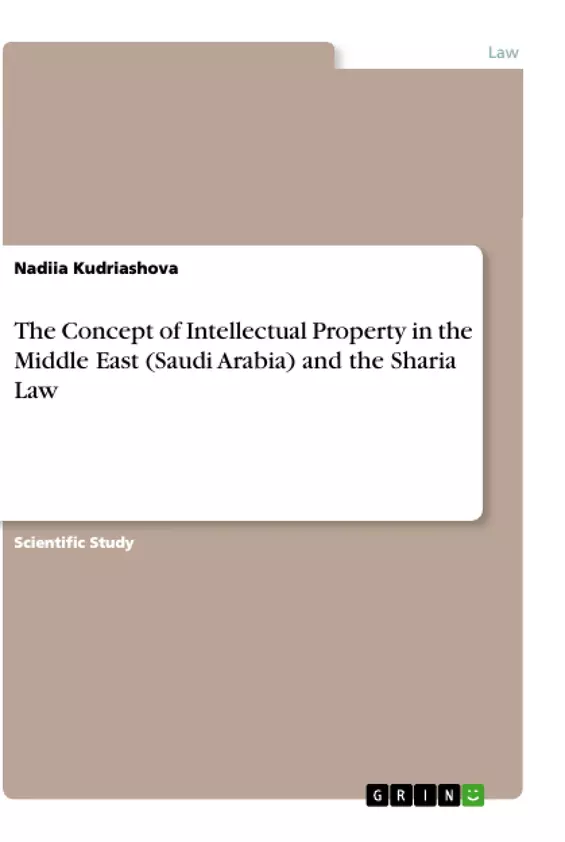At present, a key factor in the development of the economy is intellectual resources - knowledge and information. The competitiveness of the country in the world markets of science-intensive and high-tech products largely depends on the effective use of intellectual property. As it is shown by the progressive experience of various countries, namely, this increases the productivity of economic activity, ensuring the dynamic development of the economy. In recent decades, the governments of many countries of the world have been paying close attention to the effective implementation of intellectual property, constantly improving its legislative regulation. In the context of continuous technological progress, leading companies in developed countries are constantly restructuring their assets, including intangible, to strengthen control in the markets of high technology products.
Inhaltsverzeichnis (Table of Contents)
- THE CONCEPT OF INTELLECTUAL PROPERTY
- The Concept of Intellectual Property in the Middle East (Saudi Arabia) and the Sharia Law
- Private Property and Intellectual Property in Islam
- The Concept of Property in Islam
- The Five Legal Ways of Acquiring Property in Islam
- Knowledge and Information as Objects of Property in the Post-Industrial Era
- Intellectual Property in Islam
- The Concept of Intellectual Property in Islam
Zielsetzung und Themenschwerpunkte (Objectives and Key Themes)
The objective of this text is to explore the concept of intellectual property in the context of the Islamic economy, particularly in Saudi Arabia, and its relationship with Sharia law. The text aims to examine how Islamic principles and legal traditions influence the understanding and regulation of intellectual property rights in the Middle East.
- The concept of property in Islam and its relationship to intellectual property.
- The five legal ways of acquiring property in Islam and their relevance to intellectual property rights.
- The challenges of defining and protecting intellectual property in a rapidly evolving digital world.
- The role of Sharia law in shaping the legal framework for intellectual property in Saudi Arabia.
- The potential for Islamic principles to offer unique perspectives on issues related to knowledge sharing and innovation.
Zusammenfassung der Kapitel (Chapter Summaries)
The first section introduces the importance of intellectual property in the modern economy and highlights the growing role of intangible assets in global markets. It further explores the regional and country-specific differences in intellectual property law and interpretations, emphasizing the need to consider the unique context of the Islamic economy.
The second section delves into the Islamic concept of property, defining it as a fundamental human right that stems from religious principles. It outlines the five legal ways of acquiring property in Islam, including exchange, acquisition of mubah (abandoned) property, inheritance, and others.
The third section addresses the challenges of defining and protecting intellectual property in the post-industrial era, where knowledge and information have become dominant economic resources. It highlights the limitations of traditional property rights frameworks in accommodating the unique characteristics of intellectual property.
The final section explores the concept of intellectual property within Islam, acknowledging its absence in explicit Quranic and Sunnah texts. It categorizes intellectual property into tangible and intangible forms, ultimately paving the way for further discussion on the legal and ethical considerations of this complex topic.
Schlüsselwörter (Keywords)
The text primarily focuses on the concepts of intellectual property, Sharia law, Islamic economy, property rights, knowledge, information, and innovation. It delves into the unique perspectives and challenges presented by the intersection of these areas, particularly in the context of the Middle East, specifically Saudi Arabia.
Frequently Asked Questions
How is intellectual property viewed under Sharia Law?
While not explicitly mentioned in ancient texts like the Quran or Sunnah, intellectual property is categorized into tangible and intangible forms within the Islamic economy, aligning with the broader concept of property as a fundamental human right.
What are the five legal ways of acquiring property in Islam?
Islamic law outlines five primary methods: exchange (trade), acquisition of mubah (abandoned) property, inheritance, and other religious legal frameworks. These principles are applied to determine the legitimacy of intellectual property rights.
Why is intellectual property important for Saudi Arabia's economy?
In the post-industrial era, knowledge and information are key economic resources. Effective legislative regulation of intellectual property increases productivity and ensures dynamic development in high-tech markets.
What challenges exist for intellectual property in the digital era?
The rapid evolution of technology makes it difficult for traditional property frameworks to protect intangible assets like information and digital innovation effectively.
Does Islam support knowledge sharing?
Islamic principles offer unique perspectives on balancing private ownership of intellectual property with the ethical and religious encouragement of sharing knowledge for the benefit of society.
- Quote paper
- Nadiia Kudriashova (Author), 2018, The Concept of Intellectual Property in the Middle East (Saudi Arabia) and the Sharia Law, Munich, GRIN Verlag, https://www.grin.com/document/500561



